The trendy whole foods, plant based diet (WFPB diet) sounds easy, straight forward, and pretty healthy. But… is it really? In this blog post we’ll take a look at this trendy style of eating and see if it’s truly as straight forward as it seems!
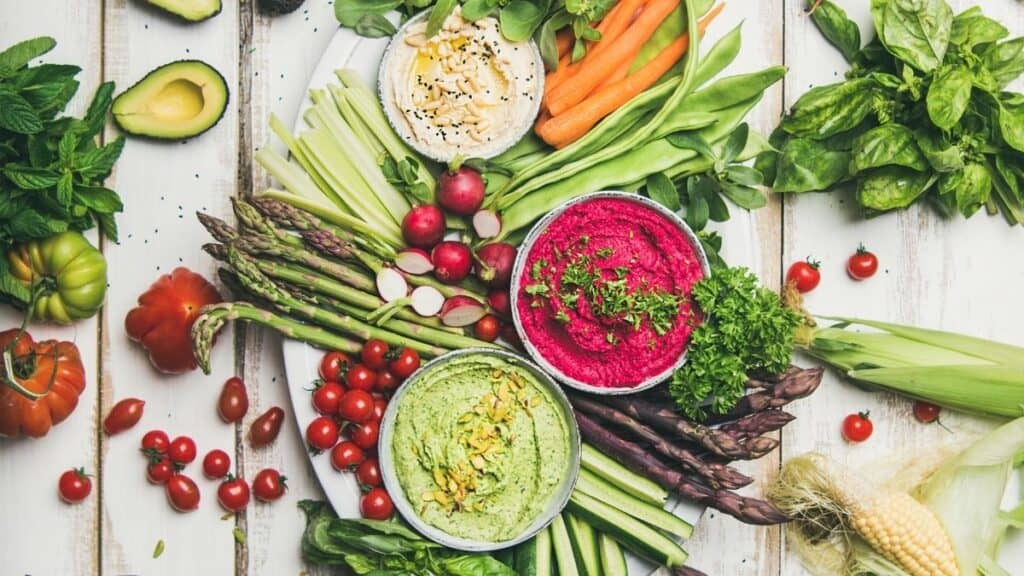
What Is A Whole Foods Plant Based Diet (AKA WFBP Diet)?
A whole foods plant based diet (or WFPB diet for short) is a diet that consists mainly of eating unprocessed foods and little animal products. It can also be referred to as the “Forks Over Knives Diet”. Remember that documentary on Netflix talking about plant based eating from, like, 2011? Yeah, that one.
Let’s break that down a little further and show some examples of foods encouraged VS foods recommended to avoid:
Foods The WFPB Diet Encourages:
- fruit
- vegetables
- starchy vegetables
- whole grains
- legumes
Foods To Avoid On The WFPB Diet:
- meat, poultry & seafood
- eggs
- dairy products
- refined sweeteners
- oils
- bleached flours, white bread & pasta
- white rice
There is also a category that is somewhere in the middle that says you should enjoy these foods in moderation. This category includes nuts, tofu & tempeh, whole grain flours & breads, and plant based milks.

Isn’t The WFPB Diet Just A Vegan Diet?
The WFPB diet isn’t the same as a vegan or vegetarian diet, although there is overlap. The whole premise of the whole foods plant based lifestyle is that it is just that, based. Vegan diets exclude all animal products where as the WFPB diet tells you to avoid them ideally, but can have. It’s kinda like the rules are less strict for the WFPB crowd VS vegan crowd.
There can also be the talk of your moral decisions here. Many people chose to become vegan for animal rights, environmental issues, etc. Where as someone may pick the WFPB diet in hopes to lose weight or get “healthier”. Not saying that these are the only reasons someone would want to try this diet, but I think that knowing the why behind the choice to pursue a style of eating is important.
Another distinction between a vegan diet is that vegans don’t necessarily limit things like whole grains, nuts, tofu & tempeh and plant based milks, like the WFPB diet does. So, WFPB is more restrictive in that way.
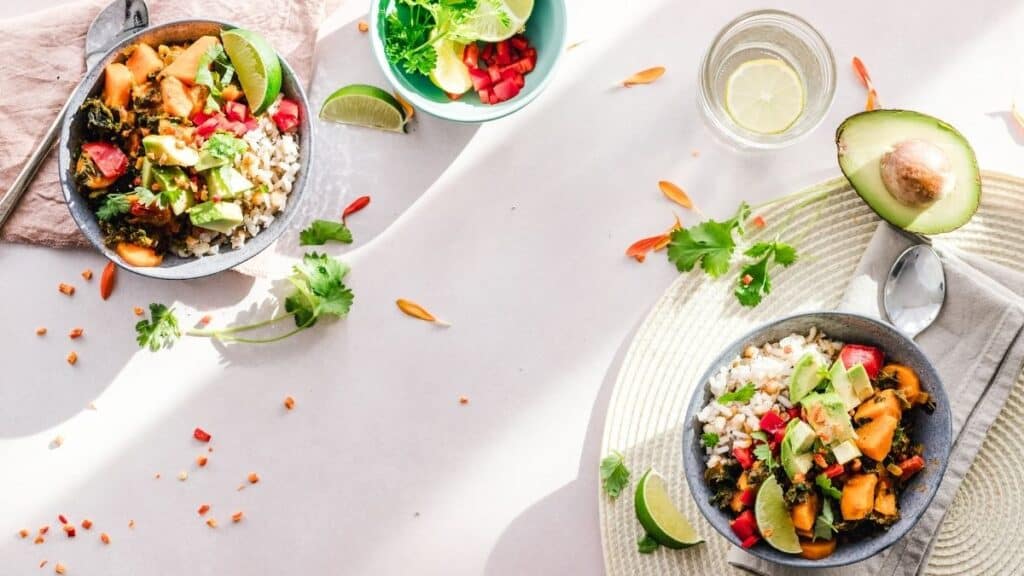
Benefits Of The WFPB Diet
Okay so let’s first talk about why anyone would even want to do this diet. I mean, there has got to be some legit benefits, right? Let’s take a look at those and see some supporting research:
It Promotes Flexibility
The fact that this diet says you can still enjoy foods that are, say, processed and not plant based (Hello, ice cream, cheese fries and pizza!) is a positive thing. It allows this style of eating to be adapted to your lifestyle and allow you to feel less guilty or like you’ve “fallen off the wagon” by, say, enjoying cake at a birthday party (something I highly encourage doing!)
There is more we will dive into about this flexibility part in a minute, but for now we will leave it at that.
WFPB Is Very Nutrient Rich & Health Promoting
The diet promotes high intakes of fruits and vegetables which are powerhouses when it comes to things like antioxidants, fiber, a slew of vitamins and tons of minerals. Due to this, diets high in fruits and veggies have been shown to lower risk for developing type 2 diabetes, decrease chronic inflammation, and improved heart health. All things I wouldn’t mind benefiting from, if you ask me! And as a Registered Dietitian, I’m all about them fruits and veggies.
Whole Foods Plant Based Is Eco Friendly
Plant based diets have been shown to be more sustainable for the environment and require less resources to sustain. One study cited a 20% reductions in diet-related greenhouse gas emissions related to consuming a plant based diet.
Downsides To The WFPB Diet
So far, sounds great, right? Well, like anything, there are two sides to the story here. Let’s go ahead and take a look at the other side of the coin, if you will.
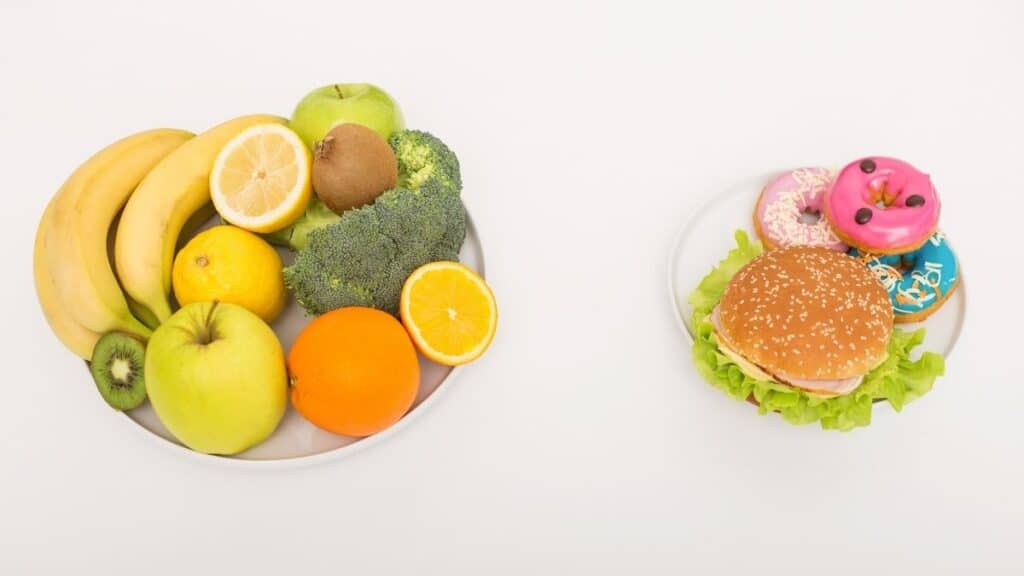
It Labels Food As “Good” And “Bad”
While the WFPB diet does promote flexibility, when it comes down to it there are foods that are still labeled as “bad” or that should be avoided. When we do this, we want the “bad” foods even more. It’s human nature. And, when we eat them, we feel guilt, shame and many times anxiety.
One study showed that those who were restricted access to foods, like chocolate, meaning they couldn’t have it on their own free will as they liked, found that those who were restricted ate more when they did get access to it than those who had access all along. See what I mean when I say if we can’t have something our bodies want it more… and more of it! This may happen when following a WFPB diet when eating, say, a fluffy white bread dinner roll. It’s like you’re finalllllly getting to eat it, so might as well get enough of it while you can before it’s restricted again. So, you take another from the bread basket, and another. Before you know it, you’re STUFF and dinner hasn’t even arrived yet.
It’s also kinda like saying “Hey! Don’t press this big red button!” Then, what do you want to do? Press the freaking button, right?! Well, in this situation a nice, creamy ice cream cone might be that red button. In our minds we think it’s all about willpower that we can control, but it’s really not. There is a lot of biological and psychological things at play here, too.
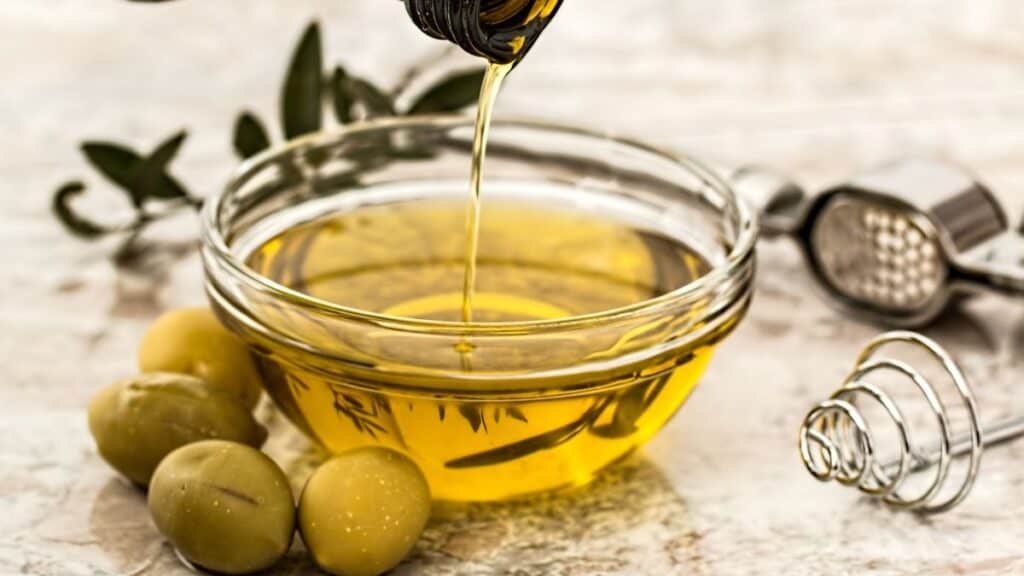
It Demonizes Oils
One of the WFPB diet rules is to avoid using oils at all costs because they claim they’re not actually a health promoting food, like we have been told think they are. The diet states that these foods actually cause heart disease, not protect against. And, even more, that using and eating foods cooked with oil is basically the same as eating sugar with a spoon. Is this true? No. And let me tell you why:
Firstly, the overwhelming body of research begs to differ and it’s continually been shown to reduce blood pressure, stroke, and increase HDL (the good) cholesterol. What is not discussed by the WFPB diet “no oil” guidelines are the different types of oils (trans, saturated, monounsaturated, and polyunsaturated for example), their cooking styles (heating certain types of oils may have negative health effects), and so much more.
Secondly, it approaches the topic with the idea that oils don’t provide anything else beyond fat… no fiber or other nutrients…so why bother? While, no, oils may not provide fiber, they do provide nutrients such as fat-soluble vitamins E and K. Both super important for our bodies such as for our blood cells, blood clotting, strong bones, and slowing the aging of our cells (yep!).
Also, oil adds flavor and satisfaction to meals, which again, super important. You can eat all of the Brussels sprouts you want and fill your stomach, but if you don’t feel satisfied by them, you’re more likely to wind up in the pantry looking for the Oreo or Chips Ahoy cookies (which are, like, so forbidden on WFPB!) to “hit the spot”. Enjoyment, satisfaction, and taste are huuuuuuge! Eating is not just about nutrients.
Thirdly, I think there is a huge fear of calories going on here- fat phobia in both sense, the nutrient and on our bodies. Which, is not uncommon in today’s world. But, just because a food is high in calories doesn’t make it bad. Calories themselves? Not bad our bodies need them in order to function. I understand the mindset of wanting to maximize the nutrition you’re getting, I am a dietitian after all. However, cutting out an entire food group is just never a good idea.
In my eyes, it’s kind of like saying that walking is better than driving a car, so you better walk everywhere. And while, yes, it’s fabulous to walk when you can, it’s also just not practical and driving a car gives other benefits too like saving time and, honestly, being enjoyable alone-time listening to a podcast. Same thing here, sure eat the avocado as a fat source for some added things like fiber, but that doesn’t mean you have to swear off oil because there are other benefits like making those Brussels sprouts taste good and giving your body those health promoting fats (Yes, I stand by that they ARE health promoting).
Also, a good majority of people begin the WFPB diet for weight loss, and avoiding oil seems like as an “easy” way to cut out calories. But again, I go back to food isn’t just nutrients and calories. And that by skipping those calories and skimping on the added satisfaction it may lead you to eating more than you would have in the end, rather than if you had just added it. And I’m not saying this with the idea that eating. less calories is the goal, I’m not at all, I’m simply kinda stating a fact. Avoiding it if you want it will likely lead you to be left looking for something to “hit the spot” still. Eat what you want and what will satisfy you. And if that means adding oil. Do it.
Bottom line here, I think that this part of the diet is hugely problematic because it can lead to tons of food fear. As someone who works with women with a heavy past of dieting, avoiding oils is a huge food rule in the disordered eating and eating disorder world. And once that rule is in your brain, it’s really, really hard to break. I mean, I’m talking anxiety from going out to eat because you don’t know how much oil is in the food. It starts off innocently, I know. But it quickly can so quickly spiral out of control.
Instead of avoid oil at all costs, here is what I suggest:
- For oils being used as salad dressings (not cooked) look for ones higher in polyunsaturated fats like grapeseed, avocado or walnut oil.
- For cooking oils, try EVOO (classic) or coconut oil.
- Play around with the amount that you add and find the amount the satisfies you VS just pouring it on (mindfulness!)
- Do also aim to include solid fats (like nuts or avocado) and see how those satisfy you, too and again, playing with portions
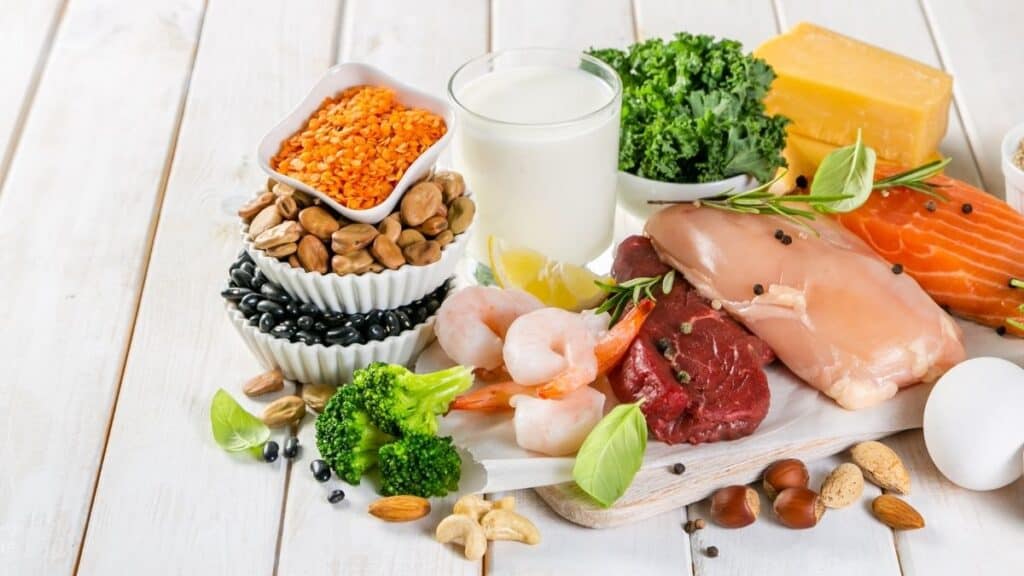
It May Cause Nutritional Deficiencies
Sticking to a WFPB diet may possibly also lead to nutritional deficiencies, like this study that showed low iron intake for example. The bioavailability of iron from plant based foods is much lower than those from animal products. Those who do follow a plant based diet may need to increase their iron intake by up to 80% to compensate for this low bioavailability. Some plant-based iron sources include: leafy greens, legumes, quinoa, and tofu to just name a few! Have at it!
Another nutrient of concern may be calcium, since dairy products are recommended to be avoided or minimized. Calcium is super important for bone health and low bone mineral density has been seen in those following a vegan diet. Our bodies regulate our calcium levels and if they notice we don’t have enough, like from not eating enough calcium-rich foods, they will break down our calcium stores (bones) to get some. Calcium can be found in some fortified foods, like orange juice or plant-based milks, but. also from sources like tofu, molasses or kale.
Zinc is another nutrient that was found to be low in those following a plant based diet. B12 is another of concern. These nutrients can be found in foods, too, like whole grains, nuts, legumes, fruits, veggies, etc. But when you put limits on those, too? It can be a slippery slope. It’s totally not impossible to get everything you need from a WFPB diet, but it just take some more planning.
Many Turn To Supplements To Meet Nutrition needs
You might be thinking “Well, I’ll just take a vitamin!” and, yes, you could. There are a lot of WFPB bloggers and YouTubers who are recommending adding a supplement, which they mention in their full days of eating posts/videos. However, as a Registered Dietitian and health professional I always recommend food first. Plus, supplements can get expensive, to be honest!
If you do decide to add a supplement it’s a good idea to ensure that it is 3rd part verified by, say the NSP of USP. It’s also a good idea to chat with a dietitian any time you’re drastically changing your intake, like would likely be the case for the WFPB diet. This can help to avoid any deficiencies that may happen.

Is A Whole Foods Plant Based Diet Budget Friendly?
This, I thought was interesting to dig into. Commonly, society feels that fruits & veggies can get expensive. And I won’t disagree that it can. (More on how to combat that in a minute) There is a section on the Forks Over Knives website that talks about how you can eat this way for less than $5 a day. However… it lists breakfast as “bananas”. I don’t know about you but A.) bananas wouldn’t fill me up. And B.) as a Registered Dietitian, I wouldn’t recommend that on the daily for a sustainable or nutrient rich breakfast. Usually our bodies are going to function much more optimally, and as a result, we will feel better, from also having some protein and fat in there which bananas don’t have a ton of.
I did find this blog post about how to eat plant based on a tight budget, which was much more helpful. I also have a blog post that I wrote on how to save cash when meal planning on a budget.
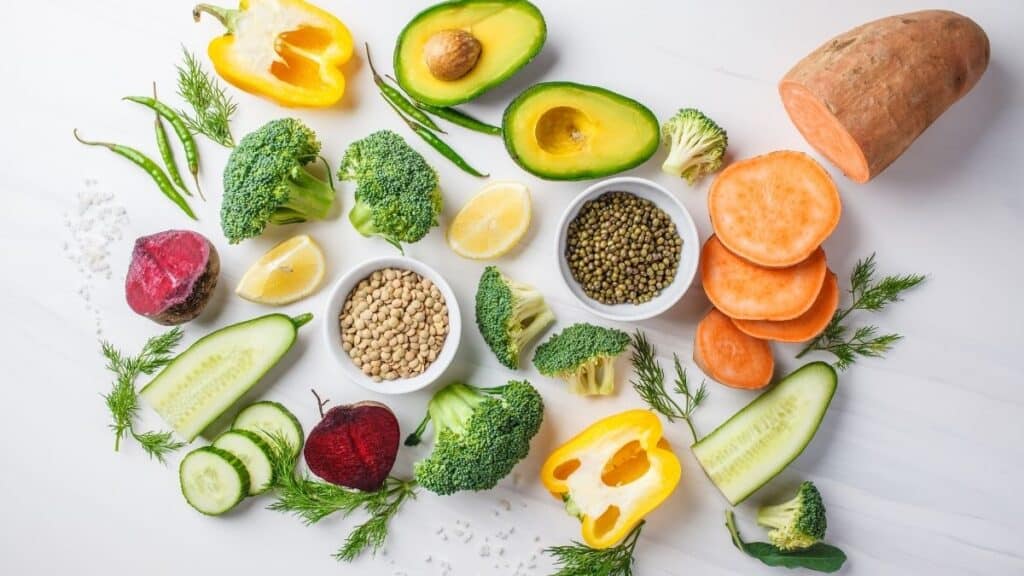
WFPB Diet Bottom Line & Re-Cap
If you know me at all, you know I don’t do diets or intentional weight loss. (Checkout my blog post on the set point weight theory if you need more info on why this is.) I don’t recommend them. I don’t support them. HOWEVER, I do believe that by digging into diets, like the WFPB diet, we can learn new information that can help us develop a style of eating that allows us to feel GOOD.
If you DO want to try out a more plant based diet, I don’t think there is anything wrong with that! Go for it Here is what I would recommend doing:
- Know your WHY. Ask yourself why are you making this change. Be honest. Is it for animal rights? To feel better? Health benefits? Weight loss? (again… if weight loss if you answer read this post on the set point weight) I believe your why should come from YOU, not diet culture saying this is “good” or will help you reach the bogus “thin ideal”.
- Pick just one thing to experiment with. Whether it is adding in some veggies at a snack, or swapping out ground beef for a can of beans. Start small. Don’t try to do a million things at once. A.) because that’s just not sustainable and B.) you don’t want to possibly cut out a ton of nutrients at once, remember those possible deficiencies we talked about?
- See how you FEEL. Is it enjoyable? Do you feel better? Simply observe what happens during this experiment without judgement. Then, decide if it’s something you want to keep doing or not! You might need more than just a day to decide, totes okay, keep experimenting!
I truly believe in the idea of experimenting with things and “trying them on for size”, if you will VS doing something because someone told you to. This is how you develop your own unique style of eating that allows you to feel good, mentally and physically! I talk about this a lot in The SociEATy and seeing others begin to develop that style of eating is just so exciting!
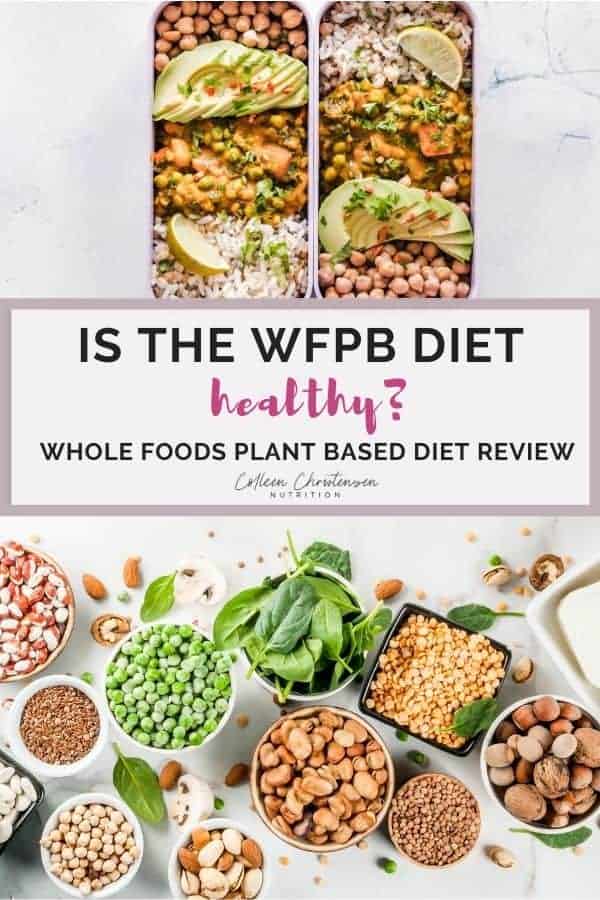
I hope this blog post gave you some clarity on the whole foods plant based diet (WFPB diet, as the cool kids say) and allows you to make your own empowered choices about food! Leave a comment with your thoughts on the topic, I love hearing from you and opening up conversations about eating & nutrition!
XOXO
-Colleen
This blog post was researched with the help of Erin Roy, RD2B
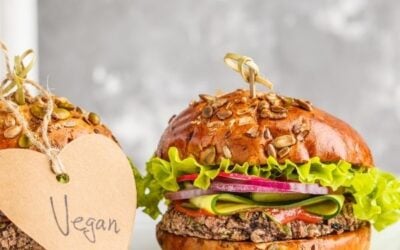
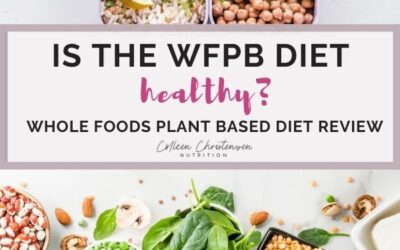
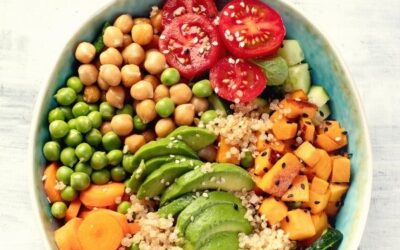



Adrienne says
I got so bored on the diet and had food fears to get over after this way of eating. I feel freer now and not so consumed with constant cooking. I also felt socially isolated. Hard to go out to eat. There is a superiority complex with most of the social influencers in that WFPB world. It was very convincing and I feel for it. Now I don’t eat as much fruit and veggies since quitting that is the down fall and my poops are not as good. 🙁 I actually got leaner after quitting. I need some meat.
Colleen says
Haha i’d get bored, too! So glad you’re finding freedom and what feels good to you!
Just nope says
What the F is with this no oil trend I really can’t even. I’m 95% vegetarian because I don’t like the idea of killing animals for food. But with this diet I don’t think I can get enough fat, protein, or calories to fuel my day without consuming 50g+ of fiber. Just thinking about this hurts my stomach… To each their own but I’ll gladly enjoy my tempeh cooked in olive oil and some eggs and toasts.
Colleen says
Totally! Fiber is great but too much.. OUCH! haha! Enjoy your oil without guilt!
Jocelyn says
Wow. I feel FANTASTIC being WFPB. When you eat simply and don’t feel like you have to make glorious meals it’s really easy, cheap, delicious, and solves my pain issues. I cook just fine without oil. I find it is a fun and creative way to cook.
I’m saddened that your negativity could influence others to not even try a diet that can improve or cure all of the major diseases caused by our Western lifestyle.
Colleen says
Hi! Totally not saying we shouldn’t include plant based, whole foods! I def think we should! I have an entire blog post on what I call “gentle nutrition”. I think the issue is when we make it a rule VS a preference and then start to view foods as good or bad, many of my readers do this! Eat how feels good to you and that you enjoy! https://colleenchristensennutrition.com/getting-started-with-gentle-nutrition/